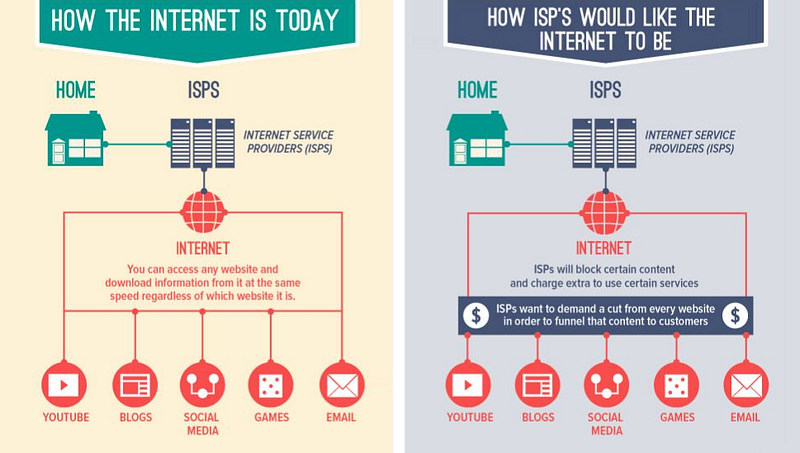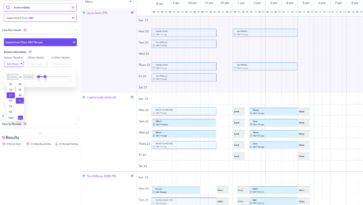
If you’ve spent any amount of time surfing the internet in the last few weeks (and I’m sure you have), odds are you’ve seen the words “net neutrality” at least a few times.
Tomorrow, Ajit Pai, the current Chairman of the Federal Communications Commission (FCC), will be leading a vote that will put an end to the FCC’s current net neutrality regulations. Those regulations, passed by a 3–2 vote in 2015, impose strict net neutrality rules, including prohibitions on site and app blocking, speed throttling, and paid fast lanes.
If voting follows party lines on December 14, it’s very likely that the current net neutrality regulations will be repealed. Without these rules in place, internet providers will have an opportunity to charge their customers more while providing less.
Jessica Rosenworcel, a Democratic commissioner on the FCC who helped originally pass these regulations says that repealing net neutrality “hands broadband providers the power to decide what voices to amplify, which sites we can visit, what connections we can make, and what communities we create. It throttles access, stalls opportunity, and censors content.”
Our Thoughts
The internet is supposed to be this great equalizer — allowing knowledge and experiences to reach a broader audience. The unfortunate truth is, however, that it isn’t as ubiquitous as we think. Some places have poor to no internet coverage and many households don’t have the luxury of affording the window into the world that the web provides. If net neutrality is repealed, we’re not just cranking the dial back from 100% access, but rather from a level of access that is already geographically and socioeconomically limited. Why should the gap be widened even further? Social networks can grant social capital. Streaming services expose viewers to art and education. There shouldn’t be a (bigger) price tag on the things that grant people access to social inclusion and mobility.
— Cassy Gibson, UX Designer
Even though we spend 90% of our time looking at cats and cat memes, there is something incredibly important about the free dissemination of information. Treating all information and sources of information equally is part of an open democracy, and is the only way we can continue to flourish. This vote threatens that openness, and deeply puts citizens at odds with those who wish to strictly control the flow of information.
— Colin Miller, Project Manager
Telecoms are natural monopolies: the fixed costs of stringing up cable/fiber to every home in the country are too great for any startup to overcome. This phenomenon insulates companies like Comcast/Verizon/AT&T from any true marketplace competition. Utilities are also natural monopolies: it wouldn’t make any economic sense for the next Zuckerberg to string up a bunch of power lines trying to disrupt your local power company. Now, imagine the world if utilities were not regulated monopolies. Imagine if PG&E could team up with Chevrolet to charge you more to power a Tesla than a Chevy Volt. Or if the water company could trickle-flow your generic off-brand shower head and reserve high water flow for premium Moen shower heads because Moen can afford the kickbacks. This is the dystopian future we’re up against.
— Colin Regan, Director of Tech
I think Net Neutrality is essential for small, dynamic businesses looking to make a major push to the forefront of their industries. Many of our clients are startups or growing midmarket businesses, and without the proper channels to market their brands, the fight to attract users and gain brand recognition becomes increasingly difficult. This limits the potential for new ideas to flow and stagnates a once ripe market for innovation.
— Chase Adams, Business Analyst
Here we are again addressing a backward policy change aimed at enriching companies who are choosing not to compete directly in tomorrow’s economy. Americans spend more money for slower internet speeds than the rest of the developed world, despite the fact that we built it in the first place. A Net Neutrality repeal will kill the tech industry and unseat America as the head of digital and technological innovation.
As a whole, our wages have remained fairly stagnant. If Net Neutrality is repealed, we will pay to pay watch Netflix, and eventually, we may stop paying to watch Netflix. Eventually, we may stop paying to scroll Instagram, and other companies responsible for leading technology development. Those on the low end of the income spectrum will be the first to lose out on information or ideas that may influence a rise in their economic status. Eventually, we will only be fed information which Internet Service Providers (ISPs) allow us to have. It’s no coincidence that the current chairman of the FCC was a Verizon lawyer and is a fan of this repeal. This policy only benefits ISP’s. Our future is at stake, and this is a direct attack on the knowledge economy.
— Geoff Brummett, UI Designer
For me, one of the scarier things about repealing net neutrality is limiting access to a service that is already fairly expensive, and how that would affect low income families. For some, paying $60+ a month for internet service is a limitation as is. So, when I think about what would happen when prices rise and the access to information dwindles, I worry about those who’s opportunities will shrink with it.
— Keenan Cronyn, Marketing Associate
What You Can Do To Help
Yes, the possibility of a Net Neutrality repeal is frightening, and yes, it’s not an easy fight to win. Before the vote tomorrow, you can do your part by joining the “The Battle for the Net”.
This site provides an easy method to contact Congress and also provides various resources to further your education on the topic.







